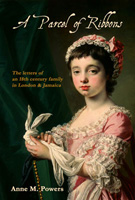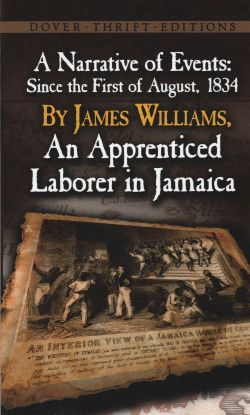
Emancipation celebrations in Spanish Town 1838
I wrote last time about the Legacies of British Slave-ownership website, and quite by chance I have now found a Will which illustrates that period of history between the passing of the abolition act and actual emancipation.
Joseph Stone Williams died on the 6th of February 1836 in the parish of Westmoreland, Jamaica. He was born about 1778, the eldest son of James Williams and his wife Frances Cecilia Stone. Although I have not found baptism records for all the family it is possible to piece together the records of nine children, drawing partly on Joseph’s Will for information. The Williams family were present in Westmoreland throughout the eighteenth century and it is probable that Joseph was the great great grandson of Rowland Williams, whose family arrived not long after the British seized the island.
Joseph does not appear to have married but like so many men in Jamaica at the time he fathered a number of children, and in his Will he made generous provision for them and their various mothers, in particular for Mary Pessoa the mother of three sons and a daughter, the last of whom seems to have died before the Will was written. You can read the Will in full here.
Joseph was the owner of three estates – Anglesea Pen, Cairn Curran and Carawina. Claims were made for compensation for all three as owner, plus three other claims (for twenty-four individuals) as awardee. There were forty-two enslaved persons on Anglesea Pen with compensation amounting to £688 2s 2d; there were three hundred and eighteen enslaved at Carawina with compensation equal to £5912 16s 11d; and at Cairn Curran eighty-five enslaved with compensation amounting to £1628 8s 10d.
Of these former slaves, who at the time he wrote his Will in 1835 had been converted to ‘apprentices’, a number were given to Mary Pessoa and are listed by name in the Will. Because Wills were written without punctuation it can be a little difficult to work out just how many individuals there are in this list but there seem to be about forty-two men and women, in which case they may constitute the workforce of the Anglesea Pen. Mary Pessoa was being left the services of these apprentices during the remainder of their apprenticeship, and Joseph Stone Williams made clear that the apprentices at Cairn Curran were to be allowed to continue to live in their accommodation ‘during the apprenticeship system without any hindrance or molestation whatsoever’.
As long as she remained single Mary Pessoa was to be allowed to continue to live in the Great House at Anglesea Pen where she had already been living with her children, and she also received furniture, household linen, Joseph’s wearing apparel, and the right to continue to pasture her and her family’s stock at Anglesea Pen. In addition to the legacies to Mary’s sons, Joseph also left legacies to Joseph and James Williams the two sons of Eliza Ward Robertson, to Mary Williams the daughter of Eliza Murray and to Ann Williams the daughter of Ann Anderson. There were legacies to various friends, family members, and servants, a large legacy to his brother William Williams, and the residuary legatee was his brother the Reverend Theodore Williams the vicar of Hendon in North London.
As I said, the list of apprentices was unpunctuated in the Will, but I have included it here with what I hope is correct punctuation so that anyone searching for ancestors in Westmoreland at this time may be able to find them.
William Grant, William Montague, William P [blank] Atkinson, George Dixon, James Arthur, James Drummond, Charles Vassall, Alexander Grant, Charles Pinnock, Thomas Williams, Richard Wellington, Nod alias William Godfrey, Amelia Murray, Eliza Grant, Grace Elizabeth Atkinson, Patience, Sarah R [blank] Arthur, Ann Wilson Bell, Margaret W [blank] Grant, Jane Smith, Jane Neill, Daphne, Hannah, Queen, Juba, Matilla, Bessy Anderson, Helen McLeod, Thomas Anderson, George Pessoa, Mary P [blank] James, Maria Williams Pessoa alias Maria Cook, James Gammon, Bonella Gammon, Maria Lewis, Robert Bowen, Jackie alias John MacLeod, Ithy (?) Girling, Mimba alias Eliza Hodges, David Bowen, William Goodin and Richard Bowen.
‘Ithy’ may be short for Ithamar in which case this is a girl or woman.
Reading the will in association with the compensation records provides an interesting snapshot of a pivotal period in Jamaican history.



